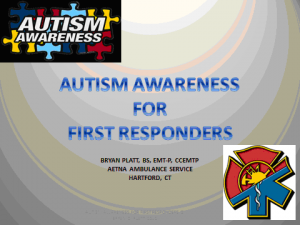by Bryan Platt
 Picture it. EMS providers are dispatched to care for an ill or injured child at a special needs school and upon arrival find a challenge that is new and different for them; the child is non-verbal and Autistic. As clinicians, how should they appropriately communicate with the patient? How should they perform an assessment and render appropriate care?
Picture it. EMS providers are dispatched to care for an ill or injured child at a special needs school and upon arrival find a challenge that is new and different for them; the child is non-verbal and Autistic. As clinicians, how should they appropriately communicate with the patient? How should they perform an assessment and render appropriate care?
As a Paramedic, I was thrust into that exact situation . As a parent of a child diagnosed with Autism, I knew detailed planning and preparation was the best solution. Finding solutions in real-time is an EMS specialty, but it just doesn’t work with kids on the autism spectrum. I collaborated with the Capital Region Education Council (CREC) and the River Street Autism Program to design a solution to this evolving EMS challenge. The River Street Autism Program has K-8th Grade in Hartford and 9th-12th Grade in Windsor; two areas that fall within Aetna and ASM’s primary service and mutual aid areas.
The collaboration created a program that uses the Picture Exchange Communication (PEC) form of communication for daily conversational interactions. The PEC system is well known to many children with autism as well as their families, teachers and caregivers. The program will allow the ambulance crews the ability to deploy PEC specially oriented towards EMS scenarios to communicate in a format that is “known” and familiar to children on the autism spectrum. These children derive comfort from familiarity, patterns and consistency.
The program which will be going “live” in the next few months in the part of Hartford served by Aetna Ambulance. The goal is to have ASM on board with this program within 6-8 months. Aetna and ASM frequently respond mutual aid into each other’s primary services areas and the program will work best if both services are on board. At the current time the program is deployed via initial training and is expanded via train-the-trainer and self-study program refreshers.
Thank you all for the continuing cooperation and excitement.
For more information on starting such a program in your area, please fill out the form found by clicking here…or by calling (860) 647-9798 x 249.
